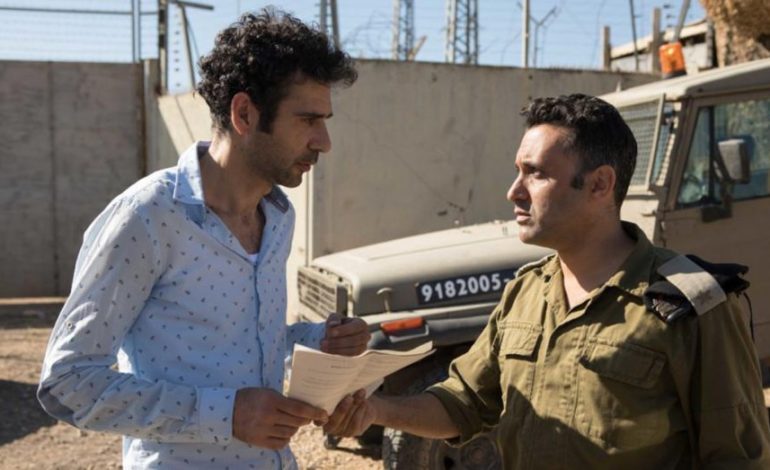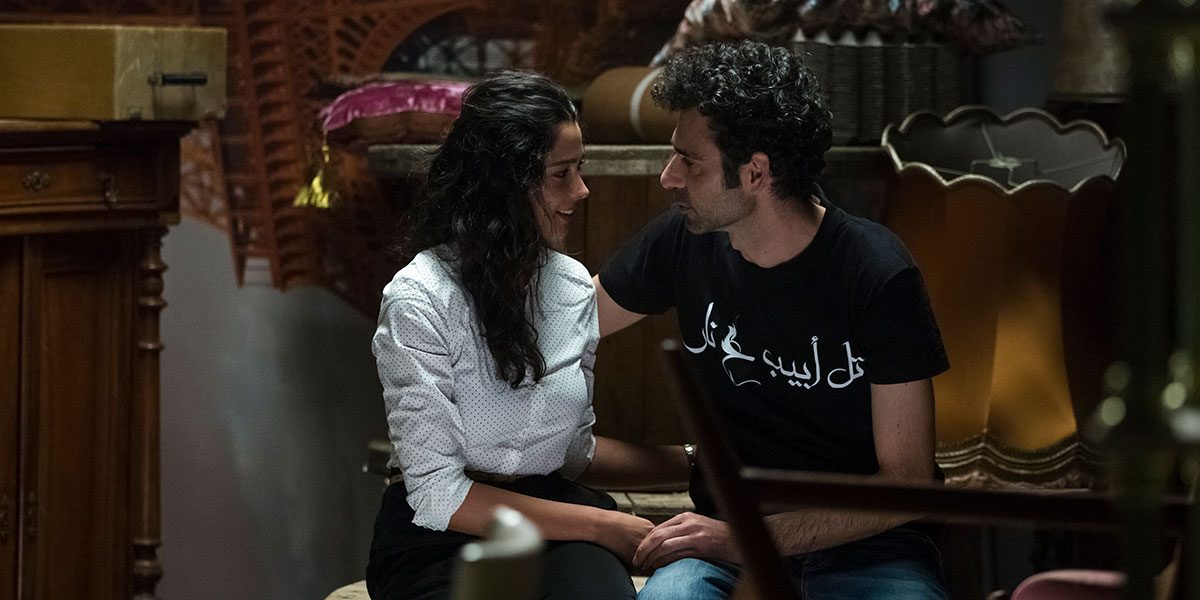

Leave it to a TV soap opera to unite both sides of the Israeli-Palestinian conflict. It’s no secret that this seventy-year geo-political struggle is amongst the most hot-button issues in the world, but satirizing the conflict is even tougher to pull off. To poke fun at decades of lives lost, territory fought over and deals violated not only risks being seen as insensitive, but biased in favor of one’s support for either party. Sameh Zoabi’s Tel Aviv on Fire, which will release on August 2nd, cleverly avoids this problem by dramatizing an endless cycle of war and betrayal through the naturally exaggerated lens of serialized television. As a comedy Tel Aviv is witty yet poignant, framing the international conflict’s legacy via a mass entertainment mirror to point out its absurdity.
The titular Tel Aviv on Fire refers to a fictional Palestinian TV show of the same name, a camp melodrama following the romantic trials of French spy Manal. Deep undercover during the Six Day War at the behest of her Palestinian lover Marwan, Manal adopts the Jewish identity “Rachel” to seduce Israeli general Yehuda and spy on the other side. Naturally, audience from both nations love it. Our protagonist Salam (Kais Nashef) is a lowly production assistant on the show, helping his uncle Bassam’s (Nadim Sawalha) studio while doubling as a Hebrew translator. He lives in East Jerusalem but commutes to Ramallah each day to help on set, which means passing through Israeli checkpoints. One day, however, a misinterpreted question gets Salam detained and sent to the head checkpoint guard.


To get out of trouble, Salam tells the guard Assi (Yaniv Bitton) that he’s Tel Aviv’s lead writer. It’s a lie: he has little writing experience and the most he’s contributed to the show was recommending how lead actress Tala (Lubna Azabal) should respond to a flirtatious comment. But it works just enough to convince Assi, whose wife and mother are big fans of the program. The only catch: Salam must promise that he “wrote” a finale where Rachel and Yehuda get married. Soon after, however, the abrupt resignation of Tel Aviv’s screenwriter, furious at the show’s willingness to pander to its Israeli viewers, suddenly puts him in the writers seat. With not much experience writing these characters, particularly its villainous romantic, Salam turns to Assi an unlikely source of collaboration.
Their relationship produces a comedic odd couple: Salam gives Assi quality hummus, and Assi gives advice on how to write the Rachel/Yehuda dynamic less mustache-twirly. He doesn’t want to see an Israeli general act like an Iraqi dictator, not realizing of course that the character embodies Palestinian distaste for the Occupation. Yet humanizing their romance causes similar backlash from Palestinian viewers, who would much prefer their TV fantasy not go turncoat. The show is ultimately a metaphor forhe Israeli-Palestinian conflict overall: a never-ending series of plot twists designed to keep drama rolling while struggling to appease two sides invested in the stakes. It just so happens that Salam is the writer overseeing that balance.
Melodrama has always been a clever genre for analyzing social issues, as it naturally exaggerates conflict to appeal to audiences emotionally. Tel Aviv on Fire is no Fassbinder product, but its use of the “show within a show” format succeeds at contrasting hammy soap drama against real-world politics. Despite their fandom obsession with this show, both audiences are divided by checkpoints, concrete borders and feelings of ongoing prejudice. Salam and Assi have personal lives- Assi wants to impress his wife and Salam wants to reconcile with his ex-girlfriend Miriam (Maisa Abd Alhady)- but those lives are equally defined by decades of war. Their arguments over character development might as well be an argument on which nation deserves to “win” more.


Being a comedy, these political divisions are treated with a degree of absurd humor. With the extremes Assi takes to dictate Tel Aviv’s finale, you’d think he’s actually debating the fate of the Middle East. Right down to a black bag kidnapping that soon turns humorous when you realize his true motive. Yet this humor signifies an underlying fact: everyone from Jerusalem to the West Bank enjoys this show, as evident by multiple shots of characters glued to their TV anticipating what will happen next. Ridiculous as the plot is, it highlights the power of pop culture as escapism, especially when the characters are stand-ins for larger societal problems.
Of course, Tel Aviv never psychoanalyzes the entire Israeli-Palestinian conflict- that’s too much discussion for a ninety-seven minute film. Rather it deconstructs where the conflict is now and how, much like syndicated television, plans to “end” it are always dictated by someone else’s shocking motives. Does Salam write something real that will offend thousands of viewers? Or should he go with televised happiness that, like multiple failed peace treaties, feels like an illusion? His final decision is very much TV melodrama.
Grade: 4 out of 5 Stars
Tel Aviv on Fire is a solid comedic watch that entertains while subtly addressing complex political topics. Seventy-plus years of irrational land disputes, war and human subjugation become about as absurd as Israel and Palestine dueling over the fate of soap opera characters. Whether this film inspires future movies that tackle these heavy themes, even in a humorous light, is uncertain. But it’s not unwelcome.
